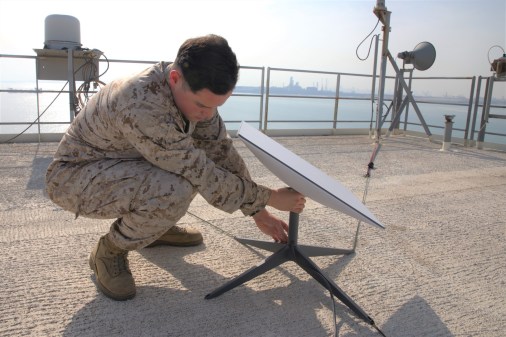Industry solicited for expeditionary medical C4IT capability that can operate on Navy ships

The Defense Department is looking for vendors to develop prototypes of a mobile command, control, communications and computers IT (C4IT) solution for expeditionary medicine that can be integrated into Navy vessels.
A solicitation for the capability was issued by public service nonprofit Advanced Technology International, which manages the Medical Technology Enterprise Consortium. Defense Department organizations often offer funding opportunities to consortium members through requests for project proposals, using other transaction agreements.
The new solicitation, issued in support of the Defense Health Agency and the Navy’s program executive office for unmanned and small combatants, specifically calls for a C4IT solution that can connect with the Consolidated Afloat Networks and Enterprise Services (CANES) network management system, Nonclassified Internet Protocol Router Network (NIPRNET) and joint operational medicine information systems, and be integrated into Expeditionary Fast Transport Flight II vessels.
The Flight II ships are configured to deploy with a medical mission capability that includes an embarked medical unit, two operating rooms, and the ability to support 147 medical patients and 38 civilian crew, according to the DOD.
Notably, officials want the new C4IT solution to be modular enough to deploy on other vessels in the future and allow for eventual interface with the Secret Internet Protocol Router Network (SIPRNET) and other networks.
“No current capabilities fully bridge the gaps between EXMED units (e.g., expeditionary medical units or EMUs), brick-and-mortar medical facilities, and other healthcare providers, such as emergency medical service (EMS) providers. Although standards exist to facilitate data interchange, there are limited solutions that offer robust communications and computer IT packages to implement standards at all levels of care, across military and civilian healthcare organizations,” per the request for project proposals.
“Resiliency, automation, and interoperability require an innovative application of networking, communications, artificial intelligence, data storage and management, and other technologies and approaches that facilitate realizing smart hospital benefits in a distributed and expeditionary environment,” officials wrote.
Capabilities must be survivable and able to operate “with limited degradation” in extreme climates; degraded or denied communications environments; scenarios where systems are under threat of cyberattacks and electromagnetic attacks; and in chemical, biological, radiological and nuclear environments, among other challenges they could face.
The prototype design should enable rapid integration of new endpoints and operations from other platforms at sea as well as ashore, the solicitation noted.
The vendor solution should also allow for “employment technologies like machine learning and data lakes to collect and process unstructured data and structured data of various formats,” according to the document.
The department currently has up to $2.7 million to award for the program. Proposals are due Nov. 25. The Defense Department plans to make a single award with the period of performance that’s tentatively slated to begin in January 2025.
The work is expected to last no more than 18 months. Faster timelines are “highly encouraged,” officials wrote.
The effort comes amid a broader push by the Pentagon to modernize its medical IT capabilities.
Just last month, the DOD issued a notice that it intends to award a high-dollar sole source contract to Leidos to continue as a systems integrator for the MHS GENESIS program as the department moves the massive electronic health record system to a cloud-based solution.





